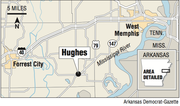A St. Francis County circuit judge said Wednesday that he will not issue a stay to stop the involuntary incorporation of the Hughes School District into the West Memphis School District.
The two districts are set to merge July 1, but the Hughes School District fought the order from the state Board of Education. The district and the state Department of Education met in court Monday in Forrest City.
Judge Richard Proctor wrote in his order, "The Court is of the opinion that a stay under the rules is neither warranted nor within the rules."
He also wrote that while numerous reasons exist to keep the district open, the law gives the Education Board the power to close a school district.
In an emailed statement, Education Department spokesman Kimberly Friedman wrote: "We are in the process of reviewing the order. We appreciate Judge Proctor for making a difficult decision and will continue to proceed in the best interest of the students of the Hughes community."
James Valley, attorney for Hughes School District, said Wednesday that the district likely will appeal to the Arkansas Supreme Court.
The Hughes School District is facing involuntary consolidation because its enrollment had fallen below 350 students -- the number required for school districts by Act 60 of the 2003 legislative session.
Valley argued Monday in court that the district had enough students during the 2013-14 school year to keep the school open and should have been allowed a one-year waiver under Act 377, passed during the recent legislative session.
The new act allows the Education Board to waive the consolidation requirement for a district if the underenrolled district is not in fiscal, academic or facility distress, and it fully complies with accreditation standards.
The Department of Education argued Monday in court that Hughes did not have enough students and did not qualify under the new law because it had been labeled as a district in fiscal distress after problems were found during a state audit.
In the written decision, Proctor did not address the enrollment at the Hughes School District. However, he wrote that the Hughes district has kept the fiscal distress label despite "allegations of improvements," and because the label remains, the court "cannot say that the decision to deny the waiver was without substantial evidence."
Beyond the legal matters, Valley raised concerns about forcing students to be bused for nearly four hours a day and making them leave the safety of their local community. Proctor wrote that those are valid concerns but not matters for the court to address.
"This Court does not have the authority under the law to be a veto of the board's actions or to have its own vote as to what is in the best interest of the Hughes School District, the students, patrons or community itself," Proctor wrote. "If that were the case, the Court would list all of the reasons that the district should remain as it is.
"This is an isolated area, a long distance from any other viable school district; it is the main employer in the entire area; the students would be required to be bused for long distances; and there are numerous other reasons to allow the school to remain open. However, this is not the Court's decision ... the law gives that decision to the Arkansas State Board of Education."
Valley said the judge's ruling was an example of why Act 60 is a bad act.
"The order seems to say the judge's hands were tied," Valley said.
Metro on 06/11/2015

